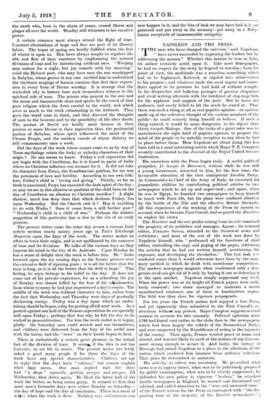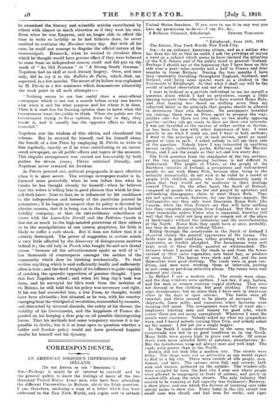NAPOLEON AND THE PRESS.
" rpHE men who have changed the universe," said Napoleon.
"have never succeeded by capturing the leaders but by addressing the masses." Whether this maxim be true or false, its author certainly acted upon it. Like most demagogues., he had no respect for the deity he feigned to worship ; from his point of view, the multitude was a senseless something which had to be frightened, flattered, or cajoled into subservience to his purpose ; and whatever made the most urgent and immediate appeal to its passions he laid hold of without scruple. In his despatches and bulletins passages of genuine eloquence and vivid writing alternate with the tawdriest of clap-trap bids for the applause and support of the mob. But he knew his audience, and rarely failed to hit the mark he aimed at. That there was such a thing at all as real popular opinion—an opinion made up of the collective thought of the various members of the public—he could scarcely bring himself to believe. If such a thing existed, it would be more dangerous to his rIgime than thirty &duds Bishops. One of the tasks of a great ruler was to manufacture the right kind of popular opinion, to prepare the mind of the people to be suitably receptive to any ideas be had to place before them. How Napoleon set about doing this has been told in a most interesting article which Major T. E. Compton recently contributed to the Journal of the Royal United Service Institution.
His connexion with the Press began early. A useful political pamphlet, Le Souper de Beauca ire, written while he was still a young Lieutenant, attracted to him, for the first time, the favourable attention of the then omnipotent Jacobin Party. As Commander-in-Chief of the Army of Italy, he exercised his journalistic abilities by contributing political articles to two newspapers which he set up and supervised ; and again, when he was in Egypt, he founded two newspapers to keep himself in touch with Paris life, but his plans were rendered abortive by the battle of the Nile and the effective British blockade. All this experience of the working of the Press he turned to account when he became First Consul, and acquired the Moniteur to exploit his views.
The Mon iteur and the net. profits arising from its sale remained the property of its publisher and manager, Agasse ; its nominal editor, Francois Suavo, attended to the theatrical news and criticisms ; and most of the rest of the work was done by Napoleon himself, who "performed all the functions of chief editor, controlling the copy and paging of the paper, criticizing the articles that he had not written himself, scrutinizing the expenses, and developing the circulation." This last task was rendered easier than it would otherwise have been by the BUMMary method in which he dealt with unwelcome competition. The modern newspaper magnate when confronted with a dangerous rival can get rid of it only by buying it out or defeating it in the open market. Napoleon simply suppressed any rival. When his power was at its height all French papers were ruthlessly censored ; two alone managed to maintain a secret unauthorized existence, one Of them in handwritten copies. The field was thus clear for vigorous propaganda.
For ten years the French nation had enjoyed a free Press, and yet apparently they submitted to the First Consul's restrictions without any protest. Major Compton suggests several reasons to account for this anomaly. Political agitation since 1789 had found vent rather in the clubs than in the newspapers, which had been largely the vehicle of the Monarchical Party, and were suspected by the Republicans of acting in the interests of the enemy. Then again, France wanted peace at home and abroad, and was not likely to cavil at the actions of any Covernment strong enough to secure it. And lastly, the victory of Marengo had raised Napoleon to a place in the affections of the nation which rendered him immune from ordinary criticism. That place he determined to maintain.
His activity as editor was unceasing. He prescribed what news was to appear intact, what was to be judiciously prepared for public consumption, what was to be utterly suppressed ; he defended his own policy in vigorous "leaders," he attacked hostile newspapers in England, he warned and threatened and advised, and called attention to the "wise and measured tone of the French writers for the Press as contrasted with "the disgusting tone of the majority of the Enzlish news-sheets " ; he examinej the literary and acient4fio articles contributed by others with almost as much. attention as if they were his own. Even when he was Emperor, and no longer able to afford the time to write so lavishly as he had hitherto done, he never omitted to scutinize the Moniteur, every day. But with all his care, he could not manage to. disguise they official nature of his communiques. Bismarck, when he wanted to circulate ideas which he thought would have greater effect if they were believed to come from an independent source, could and did put on the mask of "An Old Prussian" or "A Strong South German.' Napoleon had no skill at such literary forgery. Once, and once only, did he try it in the Bulletin de Paris, which died, unregretted, in a few months. The secret of its failure was explained by M. Fieves in a few sentences which demonstrate admirably the weak point in all such attempts :—
"Nothing seems to me less useful than a semi-official r.ewspaper which is not out a month before every one knows who owns it and for what purpose and for whom it is done. Then it is read less for forming opinion than to know what the Government want the public to think. When the public see the Government trying to form opinion from day to day, they resent it, and it usually has the opposite effect to what is intended."
Napoleon saw. the wisdom of this advice, and abandoned the scheme. But he secured for himself, and for himself alone, the benefit of a free Press by employing M. Fieves to write to him regularly, exactly as if he were contributing to an uncensored newspaper, on all public affairs and topics of the moment. This singular arrangement was carried out honourably by both parties for eleven years ; Fieves criticized liberally, and Napoleon never resented his freedom.
As Fieves pointed out, political propaganda is most effective when it is most secret. The average newspaper-reader is in. fluenced most powerfully when he sees before him what he thinks he has thought already for himself—when he believes that the writer is telling him in good phrases that which he himself doth know. Next to that, he is influenced by his confidence in the independence and honesty of the particular journal he patronizes ; if he begins to suspect that its policy is dictated by ulterior reasons, that it is being run in the interests of a. limited liability company, or that its extraordinary coincidence of views with the Loamshire Herald and the Pottleton Gazette is due not so much to the high-minded patriotism of their editors as to the manipulations of one unseen proprietor, his faith is likely to suffer a rude shock. But it does not follow that it is entirely destroyed. The power of suggestion. in certain minds is very little affected by the discovery of disingenuous motives behind it ; the old lady in Punch who bought So-and-so's dental cream "because all the advertisements spoke so well of it" has thousands of counterparts amongst the section of the community which does its thinking mechanically. To that, section anything which is said sufficiently loudly and sufficiently often is true ; and the dead weight of its influence is quite capable of crushing the sporadic opposition of genuine thought. Upon this fact Napoleon relied ; and when his long, day's task was done, and he surveyed his • life's work from, the isolation of St. Helena, he still held that his policy was necessary and right. If his son had succeeded him, a free Press, he thought, would have been advisable ; but situated as he was, with his country emerging from the whirlpool of revolution, surrounded by enemies, and distracted by internal discords, the safety of his throne, the stability of his Government, and the happiness of France depended on his keeping a firm grip on all possible disintegrating. forces. That his methods had some temporary success it is impossible to doubt; but it is at least open to question whether a bolder and franker policy, would not have produced happier results for himself and his dynasty.















































 Previous page
Previous page